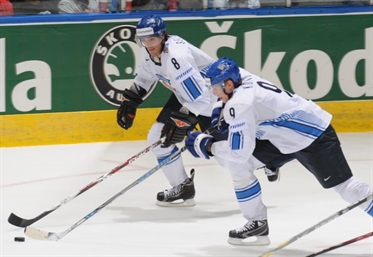Wounded Lions
Wounded Lions
Only one Koivu in Sochi, who may not be 100 per cent

 Teemu Selanne and Mikko Koivu are among the veteran players on the Finnish team although the latter has yet to stage his comeback after a foot injury. Photo: Matthew Manor / HHOF-IIHF Images
Teemu Selanne and Mikko Koivu are among the veteran players on the Finnish team although the latter has yet to stage his comeback after a foot injury. Photo: Matthew Manor / HHOF-IIHF Images
Now Westerlund is following NHL action worried, hoping he’ll still have the same problem with playing off their positions. Just as Westerlund had got message from Saku Koivu about his not feeling ready to play in Sochi, Mikko Koivu had surgery to repair a broken ankle, which has kept him out of NHL action until... well, the Olympics. Valtteri Filppula, leading Finnish scorer in the NHL, suffered an injury this week, and Aleksander Barkov, another centre, has been nursing a knee injury.
Not that offence was going to be Finland’s biggest strength to begin with, but Westerlund surely hopes that he can get the best possible offence with him to Russia.
Finland’s strengths are the same as always: superb goaltending, disciplined team play, and the element of surprise reserved for the underdog.
But there’s no doubt that Finland’s goaltending is good. Take any statistical category, and one of the Finnish goalies – Tuukka Rask, Antti Niemi, Kari Lehtonen – is, if not on top of the list, then at least near it.
The Boston Bruins’ Rask has posted the NHL’s seventh-best goals against average (2.12), and has no other Olympic goalies ahead of him. Rask’s save percentage (92.8) is the fifth best in the league, and again, the best of all goaltenders going to Sochi.
Kari Lehtonen has played most minutes in the league, Antti Niemi is second. Niemi’s 27 wins in 45 starts is second in the NHL, with only non-Olympian Marc-Andre Fleury ahead of him. Rask has 25 wins.
Continue reading“Well, we all know that hockey is a game in which a team tries to score goals at one end of the rink and protect its own net at the other, and if we have good goaltending, it’s a good start,” Westerlund told IIHF.com recently.
Westerlund returned to the national team for this season, after Jukka Jalonen had coached Finland to bronze medals in Vancouver. Westerlund’s team played in the final in the 2006 Olympics, and his return has ignited hope across Finnish hockey scene. His return even made Olli Jokinen to unretire from the national team.
But unlike most of the other big nations – and besides the goaltenders – Finland doesn’t have NHL superstars. Teemu Selanne is a legend, but at 43, he’s no longer the foundation of the team, even if Westerlund hopes the Finnish Flash can find his scoring touch in Sochi.
“We’re a small nation, and while we do have skilled players, we can’t count on having the best players in the world so we have to find our competitive advantages somewhere else, in working together as a team,” says Westerlund.
During the last year, Westerlund, dubbed “hockey professor” in Finland, has analyzed the trends of international hockey, trying to crack the code for success in the Olympics.
“There’s no one right answer. We have fewer players in the small NHL rinks than before, and fewer that the other top nations, but on the other hand, we have good players in the KHL, and they play all season long in a big Olympic-sized rink,” he says.
All goaltenders play in the NHL, but of the defenceman only four do. Of the remaining four, Sami Lepistö and Juuso Hietanen play in the KHL, while Ossi Vaananen and Lasse Kukkonen, two national team veterans, play in the Finnish league.
In offence, Finland has ten NHLers, three forwards from the KHL, and one – Juhamatti Aaltonen – from the Finnish league.
And with the exception of Saku Koivu, who declined invitation to the team, and possibly the Florida Panthers’ Sean Bergenheim, no NHLer can consider themselves snubbed.
The leading Finnish scorer in the NHL, Valtteri Filppula, is 45th in league scoring. Number two, Jussi Jokinen, is 53rd. But Westerlund believes his team is good enough.
“The differences between the teams are marginal, especially in a short tournament with best-of-one playoffs. The puck bounces and some random event can dictate the result of the game. We can beat anyone in one game – but we can also lose to them,” says Westerlund.
“Of course, the margin of error is bigger than in, say, ski jumping, where the athletes have to get their timing right within 0.3 seconds. At least we have 60 minutes to work with in hockey,” he concludes.
Projected Result
Finland will play its way to the quarter-final, and the randomness of the short tournament will play into their chances. In Vancouver, Finland played against the Czechs, while Canada and Russia played in another quarter-final. Finland is battling for a fourth medal in the last five Olympics.
Top-3 Players
Tuukka Rask is expected to carry the ball for Finland. The 26-year-old goalie hasn’t represented Finland in the Olympics or even the Worlds before, but is now ready to show the world what he can do when he’s got Kimmo Timonen instead of Zdeno Chara in front of him.
Mikko Koivu has been tabbed the team’s first-line centre, and while the ankle injury came at an unfortunate time, Koivu has shown that he can elevate his game when he plays for his country.
Valtteri Filppula is a coach’s dream: A conscientious player who can score goals or shut down opponents, and play any of the forward positions.
Dark Horse
Teemu Selanne, 43, hasn’t scored a goal in the Olympic playoff stage since the Salt Lake City tournament, and collected just two assists in the six playoff stage games in 2006 and 2010. He is, however, the leading all-time Olympic scorer, and maybe a short tournament while playing for Westerlund can ignite the Finnish Flash.
Back to Overview











































